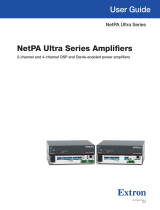
1
RMio64-D Firmware Update Guide
Thank you for choosing a Yamaha product.
This guide explains how to update the RMio64-D firmware and its built-in Dante
module firmware.
■ Precautions (Please be sure to read this section first!)
• The user assumes full responsibility for the update.
• Please note that the device may be damaged if you fail to follow these instructions
properly, or turn off the device or disconnect the cable while the update is in
progress.
• If the update fails, and the device still does not operate correctly even after you
execute the update once again, please contact your Yamaha dealer.
• Yamaha Corporation owns exclusive copyrights for the RMio64-D firmware, its
update program, and the update guide.
• Audinate owns exclusive copyrights for the Dante firmware and its update
program.
• It is prohibited to duplicate or modify the firmware, software or guides, in part or
in their entirety, without permission from the copyright owner.
• The screen shots in this guide are for use with this update procedure only and may
be different from the actual screen shots.
• Dante is a registered trademark of Audinate.
• Windows is a registered trademark of Microsoft
®
Corporation in the United States
and other countries.
• Mac, Macintosh, and Bonjour are trademarks of Apple Inc. registered in the U.S.
and other countries.
• The company names and product names in this document are the trademarks or
registered trademarks of their respective companies.

















